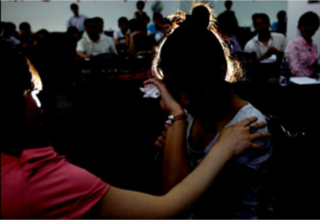In 2011, the United Nations General Assembly passed a resolution adopting 11 October as the International Day of the Girl Child, recognizing girls’ rights and the unique challenges girls around the world face realizing them.
UNFPA works to protect the health and rights of adolescent girls through access to sexual and reproductive health counselling, information and services; comprehensive sexuality education; and through encouraging girls' empowerment and participation in the decisions that most affect them. UNFPA also works with boys and men to advance gender equality, and to encourage the abandonment of harmful practices and stereotypes.
Digital Generation: Technology and innovation as accelerators of girls’ bodily autonomy
Digital connectivity for all girls is critical for human rights and can improve girls’ bodily autonomy, decision-making, and movement building. But today, girls have less access than boys to the internet and technologies and as a result, what they could achieve, their gifts, vision, ingenuity and the passion they could offer to the world is lost.
This year, under the theme, “Digital Generation: Technology and innovation as accelerators of girls’ bodily autonomy” let’s celebrate girls in the digital generation who are harnessing the power of new technologies to carve out a better future for all, and call urgent attention to those left behind by gender discrimination that systematically limits girls, now and across their lifetimes.
As virtual formats and digital connectivity expand and open new opportunities for girls, International Day of the Girl 2021 will focus on their demands to:
- Close the digital gender divide in connectivity, devices and use
- Channel their creativity to design innovative digital solutions to help girls achieve their rights and secure their bodily autonomy
- Create a digital world that is accessible and safe for all
Ways to get involved
- Amplify girl’s leadership and actions in designing innovative digital solutions for a more equal future.
- Share stories of inspiring adolescent girls or girl-led organizations who are using new technologies to reach youth with accurate sexual and reproductive health information.



